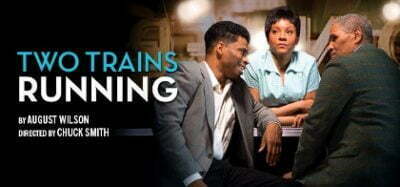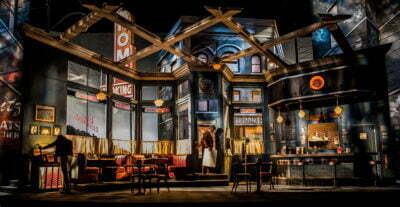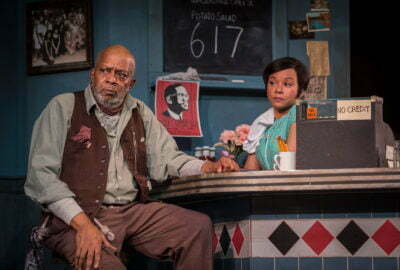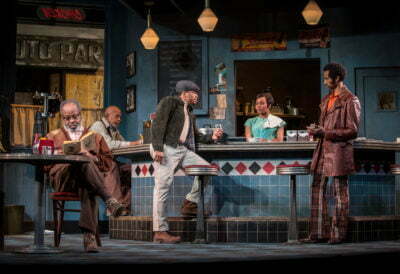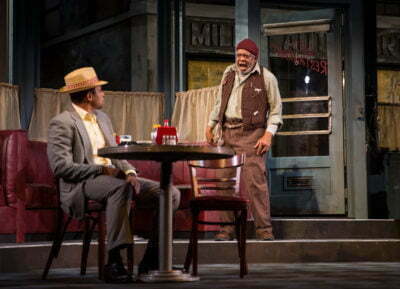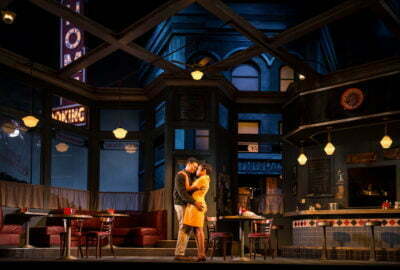Two Trains Running
Directed by Chuck Smith
Produced by Goodman Theatre
Goodman Pays Tribute to Great Writer and Friend
The tenth year since August Wilson’s death provides a fitting time to honor the author who wrote a play for each decade of the twentieth century. Across the city, the ten plays Wilson considered part of his “Century Cycle” are being presented in various forms and venues. Leading the productions is the Goodman Theatre, which had a particularly close relationship with him. Chuck Smith’s production of the 1993 play Two Trains Running demonstrates Wilson’s greatest strength as a poet and a chronicler of black men’s daily ambitions and fears, as well as his warm heart.
Why this play, instead of the better known Fences or The Piano Lesson? Artistic Director Robert Falls explains that, set in 1969, Two Trains Running takes place in the earliest period Wilson had personal knowledge of as an adult, and therefore, could directly represent himself through. The play takes place in a diner, designed by Linda Buchanan in beautiful blue, with large windows that show the city beyond. The owner, Memphis Lee (Terry Bellamy) is battling with the city, which is seizing his land through eminent domain. They want to pay him only twice what he spent on the building decades ago, seeming not to understand or care that they are depriving him of his livelihood, as well as the restaurant itself. Most of the rest of the block is owned by the undertaker West (A.C. Smith), who has long harbored designs on Lee’s land as well, and knows this is his last chance to get it.
Memphis and West have both gone through more than their share of hardships, and Memphis still dreams of returning to Jackson one day to reclaim the land a white mob drove him off. For now, Memphis yells at his sole employee, Risa (Nambi E. Kelly) to prepare food as if they’re expecting customers, and complaining about Wolf (Anthony Irons), who drops by daily to collect peoples’ bets on the numbers game. The usual diner community is unsettled by the arrival of a stranger, Sterling (Chester Gregory). He’s just been released after being sent to prison for robbing a bank, and hopes to get a real job so he won’t wind up back in. That’s easier said than done, and he winds up joining the black power movement. He also pursues a relationship with Risa, even though she’s a cutter, apparently because he needs a girlfriend to feel in control of his life, and she’s the only woman around.
Wilson wrote in a variety of styles, and Two Trains Running is more like a log of conversations than a triangle shaped drama. The characters report on and mull over various frustrations with the system and each other. As Memphis, Bellamy is irascible and as fed up with injustice as stupidity. But though he criticizes the turn the civil rights movement has taken, Chuck Smith doesn’t focus the conflicts on age. Gregory imbues Sterling with charm and potential that seems lost on Memphis, but is apparent to the audience. A.C. Smith’s West is formidable as the richest man around, but also tragic in his inability to move on from a wife he’s been mourning for decades. Nambi E. Kelley grants the rather opaque character Risa a compelling inner life through her gestures and expressions. We never learn everything about her, like why she cut her legs (and something else), but Kelley plays her convincingly enough for us to believe there’s a reason. She clearly is deeply empathetic, even as she defends herself from Memphis’s constant haranguing. Irons’s Wolf is as cool as Sterling is talkative, and though he pursued Risa, he doesn’t stake as much of his self-regard on her interest or anyone else’s approval.
Two other characters, Holloway and Hambone (Alfred H. Wilson and Ernest Perry Jr.), are less involved in the plot, but contribute to Wilson’s distinctive atmosphere. Holloway is a retiree who has made his home in the diner, and advises troubled people to visit Aunt Ester, a woman who is over three hundred years old. Though several characters tell stories, Alfred H. Wilson makes Holloway’s recounting of his hated grandfather especially enthralling because it is the one time passion breaks through his world-weariness. Hambone is a mentally challenged man who was once offered a ham if he did a good enough job painting a fence, and has been crying out for his ham ever since. Perry plays him with tics and palpable outrage, which though comic, is not pathetic. Holloway speculates that Hambone’s behavior may have a good reason after all, and Sterling comes to see him as emblematic of African-Americans have been deprived of their fair share.
Chuck Smith’s directing walks a fine line between keeping the play from becoming boring and still giving a taste of how much the passage of time weighs down on these characters. The endlessly repeated rituals, like West ordering sugar and then not using any, make the diner discussions seem part of a centuries long process. (Several of these actors recently appeared in Court’s production of Waiting for Godot, in a coincidence that will makes this existential drama stand out all the more.) Their complaints about how society and the government is set up to cheat them out of everything they earn for themselves resonate as deeply as ever. Two Trains Running is quintessential August Wilson, for everything you like or dislike about him. The Goodman’s production shows his work at its finest, and should not be missed by anyone with any interest in theatre.
Highly Recommended
Jacob Davis
Reviewed March 16, 2015
Listen to my interview with Ernest Perry, Jr.
This show has been Jeff recommended.
For more information, see Two Trains Running’s page on Theatre in Chicago.
Playing at the Goodman Theatre, 170 North Dearborn, Chicago. Tickets are $27-80, or order, call 312-443-3825 or visit GoodmanTheatre.org. Plays Wednesdays and Thursdays at 7:30 pm, Fridays at 8:00 pm, Saturdays at 2:00 pm (except March 21) and 8:00 pm, and Sundays at 2:00 pm and 7:30 pm (except April 5 and 12) through April 12. Running time is two hours and forty-five minutes with one intermission.

